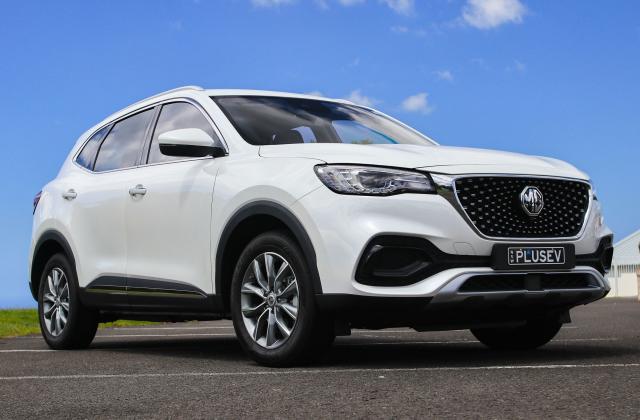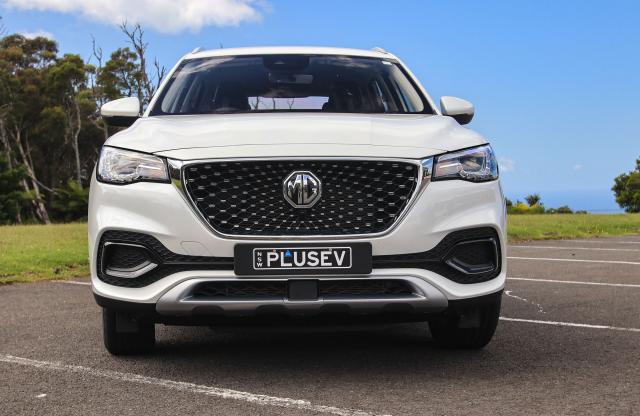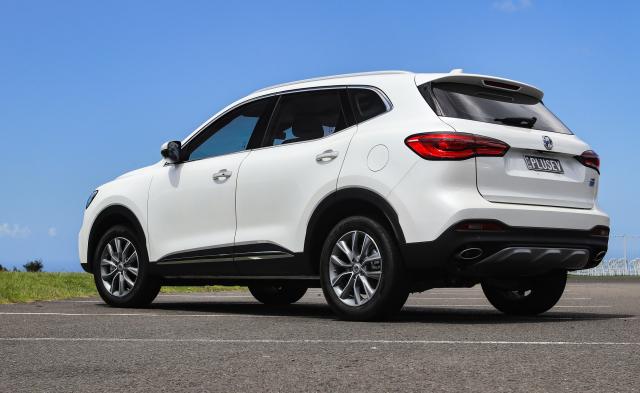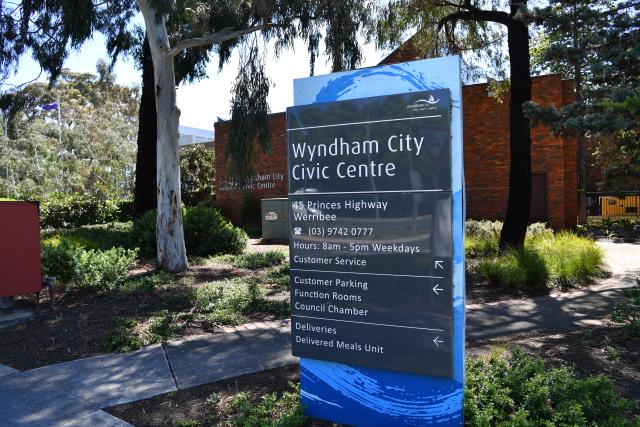The ongoing growth in Australian sales of MG vehicles continues to gather pace with the Chinese importer now sitting in seventh place of 2022 year-to-date sales at the end of April.
The company’s success is all the more impressive given that there are only three models in its range, the MG3 hatchback, ZS small SUV and HS mid-sized SUV.
The two SUVs are offered with different levels of electrification, the ZS is fully electric while the HS is a plug-in hybrid. Both come with the choice of Excite and Essence equipment levels.
The subject of this week’s review is the HS plug-in, originally branded, logically, as the HS PHEV but subsequently renamed, probably at the behest of the company’s marketing branch, as the HS +EV. We were in the higher-specced Essence variant.
STYLING
MG HS +EV is a neat and stylish vehicle without anything to make it stand out from the SUV crowd. The front is dominated by a large honeycomb grille with the familiar ‘MG’ badge at front-and-centre. The grille then flows into wide, narrow headlamps with daytime running lights above extended lower air vents, also honeycombed.
How many buyers, especially younger ones, recognise that iconic badge and its history is an interesting question – we suspect not many.
The Essence variant comes with LED headlights – Excite fails to live up to its name and only gets halogen along with 17-inch alloy wheels. Essence has 18-inch diamond-cut alloys, front foglights and clever puddle lights displaying the MG badge.
INTERIOR
Entry is easy to manage and there’s good interior space. Rear legroom is acceptable and there’s plenty of headroom despite the Essence’s panoramic sunroof.
Excite comes with polyurethane / PVC seats while the Essence steps up to two-tone leather front sports seats with power adjustment and heating as well as LED ambient lighting.
Boot space is a reasonable 451 litres with the rear seats in place and expands to 1275 litres with the seatbacks folded. Essence comes with a powered tailgate. The battery charging cable is stored below the boot floor meaning that there’s no room for a spare wheel, instead you’ll need to rely upon the supplied tyre repair kit if you get a puncture, a growing risk in pot-hole riddled Eastern Australia.
POWERTRAIN
MG HS +EV combines a 1.5-litre 119 kW / 250 Nm turbo-petrol engine with a battery providing 90kW / 230 Nm to the electric motor for a combined output of 189 kW and 370 Nm.
All-wheel drive is available in the petrol-only HS but, at this stage, the +EV is front-wheel drive only.
An advanced gearbox transfers the power from the petrol engine and the electric motor to the front wheels. The petrol engine’s drive torque is transmitted by a six-speed automatic gearbox, while the electric motor transmits the power through a four-speed electronic drive unit. Together, they form a 10-speed automatic gearbox, enabling the vehicle to choose the ideal gear and change gear smoothly and rapidly.
Charge time is listed at around seven hours from a normal household socket. We were able to charge from empty to full in just under four hours from our 7kW JetCharge wall box.
INFOTAINMENT
Inside there are two large screens, a 12.3-inch fully digital instrument cluster with built-in satellite navigation and a 10.1-inch multi-function high-definition infotainment colour touch screen with large user-friendly displays.
Smartphone mirroring is available through cabled Apple CarPlay or Android Auto with two USB ports at the front and another pair at the rear. Satellite navigation is standard in both variants.
There’s a six-speaker 3D surround sound audio system.
SAFETY
Standard safety features in both Excite and Essence models include six airbags; enhanced ABS brakes; electronic stability program; active cornering brake control; front seat impact absorbent door padding; hill start assist; emergency automatic door unlocking and hazard light activation; tyre pressure monitoring; reversing camera; and rear parking sensors. Essence adds a 360-degree overhead camera.
Also standard in both variants is the MG Pilot package which adds enhanced features such as adaptive cruise control; forward collision warning; automatic emergency braking; lane departure warning; traffic jam assist; intelligent cruise assist; blind spot warning; rear cross traffic alert; intelligent headlamp control; and speed assistance system.
DRIVING
As is the norm with hybrids the HS +EV moves off under battery power with the engine kicking in at around 30 km/h or earlier under hard acceleration. Tapping the ‘EV’ button on the centre console ensures that the engine doesn’t activate while ever there is charge in the battery.
Factory tested fuel consumption figures had us scratching our heads with the city cycle showing 5.8 litres per 100 kilometres and the combined city/highway cycle just 1.7 L/100 km. That latter figure is dependent upon the battery being fully charged to start with and supplying the first 63 kilometres of the hypothetical 100-km trip with zero fuel being used and the remaining 37 km, under hybrid mode, using the 1.7 litres.
To extend that 1.7 L/100 km beyond that 100 km would require the battery to be fully re-charged before proceeding. We tested the fuel consumption with no charge in the battery and averaged 6.9 L/100km on our predominantly motorway drive from Gosford to Sydney helped along by the usual brake regeneration feature of most hybrid.
These issues aside we found the plug-in MG to be a very impressive vehicle. The instant torque and silent running of EVs contribute to a very enjoyable driving experience.
Testing in EV mode with the battery fully charged, and driving conservatively over flat roads, we were able to just about match the claimed range of 63 kilometres.
Performance is capable but unexciting as is the norm with vehicles in the SUV segment. Steering is a little heavy but responsive enough.
Unlike other EVs the amount of brake regeneration when decelerating cannot be adjusted but we found that the level was just right, effective without being too intrusive.
The twin information screens are easy to read and operate although, as is becoming increasingly common, too many of the most-used features needed screen taps rather than being physical knobs.
While we appreciate that the lane-correction safety feature can assist lazy and inattentive drivers, like almost everyone that we’ve talked to, we turn it off at the earliest opportunity. In the HS +EV it’s simply a matter of giving two taps on a button at the end of turn indicator on the steering wheel stalk.
SUMMING UP
The MG HS +EV competes against the well-established Mitsubishi Outlander PHEV and the just-realised Ford Escape PHEV in the mid-sized SUV segment. With driveaway prices starting at $46,990 it’s the cheapest of the three and comes with the longest (seven-year) warranty.
Whether the extra $10k for the +EV over its petrol-only HS equivalents can be justified will depend on buyer’s individual circumstances. For urban buyers with short distance commutes and a home wallbox it would make sense.
Importantly, with long waiting times for most of its competitors, buyers can get into most MG models within weeks rather than waiting many months or even years.
AT A GLANCE
MODEL RANGE
HS 1.5 Core 2WD: $29,990
HS 1.5 Vibe 2WD: $30,990
HS 1.5 Excite 2WD: $34,990
HS 2.0 Excite X AWD: $37,990
HS 1.5 Essence 2WD: $38,990
HS 2.0 Essence X AWD: $42,990
HS 1.5 Essence Anfield: $40,690
HS +EV 1.5 Plug-In Hybrid Excite 2WD: $46,990
HS +EV 1.5 Plug-In Hybrid Essence 2WD: $48,990
Note: These are drive-away prices and include al



















